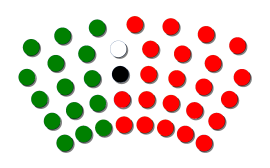- Fecha(s): 06/03/2020
- Lugar: Seminario Economía Aplicada - Planta 3
- Ponente: Alfonso Rosa

We study experimentally how to prevent bank runs using a mechanism inspired in Andolfatto et al. (2017). They propose a mechanism that eliminates bank runs as an equilibrium situation of the deposit contract and implements uniquely the efficient outcome. In our experimental enviroment bank runs may emerge both as a coordination failure in equilibrium and…
- Fecha(s): 30/01/2020
- Lugar: Seminario del Departamento de Métodos Cuantitativos para la Economía y Empresa, UMU.
- Ponente: Ainoa Aparicio Fenoll. University of Turin

Abstract: I estimate the effect of being the best in the class} in the early years of schooling on future academic performance. I implement a novel methodology that does not require experimental data. My methodology exploits that some students are the best in the class because better students in the same school are assigned to…
- Fecha(s): 04/04/2019
- Lugar: Seminario del Departamento de Métodos Cuantitativos para la Economía y Empresa, UMU. Retransmisión en directo.
- Ponente: Francisco Cabo. Universidad de Valladolid

The paper analyzes the interaction between individuals belonging to two distinct populations, who share the same strategy set but differ in their payoff matrices. A two-population evolutionary game describes this interaction, that presents a double dimension. On the one hand, agents in one population play a game against individuals within their own and also the…
- Fecha(s): 05/04/2019
- Lugar: Aula Martínez Gallur
- Ponente: José Carlos González Pimienta (Universidad Carlos 3 de Madrid)

We test the turnout predictions of the canonical costly voting model through a large-scale, real effort experiment. We recruit 1,200 participants through Amazon’s Mechanical Turk and employ a 2 x 2 between subjects design encompassing small ( N = 30) and large ( N = 300) elections, as well as close and lopsided. As predicted,…
- Fecha(s): 21/03/2019
- Lugar: Seminario del departamento de Economía aplicada. Retransmitido en directo.
- Ponente: David Jiménez (U. Alicante)

Abstract: Nudges, which are interventions that do not restrict choice, have become widespread in policy applications. I develop a general and tractable framework to analyze the welfare implications of nudges. In this framework, individuals suffer from internalities (their utility when choosing is different from their welfare-determining utility) and choice and welfare depend on the environment,…
- Fecha(s): 25/01/2019
- Lugar: Seminario Martínez Gallur B2/02
- Ponente: Juan Vicente Llinares
- Ponente: Susana Álvarez

Abstract: The consequences that educational underperformance has on both individuals and society as a whole lead policy makers and planners to focus on how to measure it properly. The aim of this paper is to propose an index to measure educational poverty which, taking as a starting point the economic literature on multidimensional poverty measurement,…
- Fecha(s): 20/09/2018
- Lugar: Seminario del Departamento de Métodos Cuantitativos para la Economía y Empresa, UMU. Retransmisión en directo.
- Ponente: Lorenzo Ductor. Middlesex University

Abstract: Are connections to decision makers valuable? Do connections lead to better or worse decisions? And if they do, why is that? We set out to answer these questions by studying connections to the editorial board members of more than 100 economics and finance journals over the period 1990-2011. Departments double their publications in a journal when…
- Fecha(s): 23/02/2018
- Lugar: Seminario del Departamento de Métodos Cuantitativos para la Economía y Empresa, UMU. Retransmisión en directo.
- Ponente: David Jiménez Gómez. Universidad de Alicante

ABSTRACT. Temptation and self-control evolved as single mechanism to make humans behave against their own self-interest. I follow a recent literature in Economics on the evolution of preferences, by modeling the evolution of self-control in a principal-agent framework. The principal can obtain the first best asymptotically by biasing the utility of the agent (from which…

Abstract We consider two families of strategy-proof social choice functions based on the majority principle: extended majority voting rules on the universal domain of preferences over two alternatives and generalized median voter schemes on the domain of single-peaked preferences over a finite and linearly ordered set of alternatives. We characterize their respective subclasses of obviously…
- Fecha(s): 23/03/2017
- Lugar: Seminario del Departamento de Métodos Cuantitativos para la Economía y Empresa, UMU. Retransmisión en directo y grabación.
- Ponente: Mª José Gutierrez. Universidad del País Vasco

Abstract: By using robustness methods we design HCRs that explicitly include scientific uncertainty. Under scientific uncertainty –when the perceived model can be generated by a nearby operating model– robust HCRs are designed assuming that the (inferred) operating model is more persistent than the perceived model. As a result, a robust HCR has a steeper ratio…











